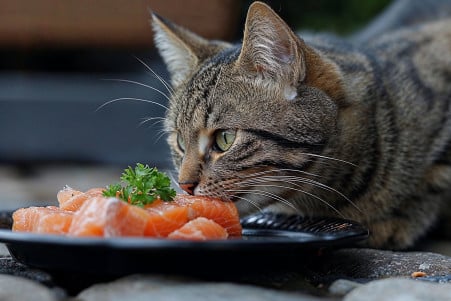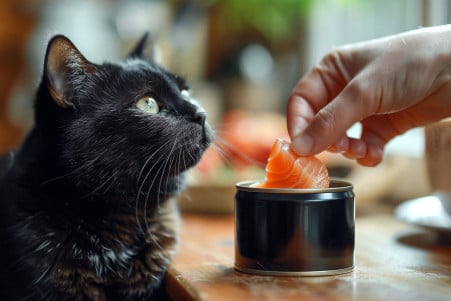Is It Safe to Feed Your Cat Raw Fish? Weighing the Risks and Benefits
3 May 2024 • Updated 2 May 2024

Is it safe to give your cat raw fish as a treat, or are there dangers that pet parents need to be aware of? While cats can eat raw fish in moderation as part of their naturally carnivorous diet, there are some risks to consider, including parasites and bacteria that can be found in raw fish and cause foodborne illness. As a result, it's best to stick to commercially-prepared, human-grade raw fish made specifically for cats.
In this article, we'll take a look at veterinary research that explores the potential benefits and risks of feeding cats raw fish. This research evaluates the nutritional needs of obligate carnivores such as cats and the dangers of foodborne illness. This way, you can learn what the research says and decide how to responsibly give your cat raw fish as a treat.
Is it safe to feed your cat raw fish?
Risks of Feeding Cats Raw Fish
There are a few risks associated with feeding cats raw fish. According to PetHonesty, raw fish can contain bacteria such as salmonella and E. coli, which can cause food poisoning in cats and people. Furthermore, the enzyme thiaminase in raw fish destroys thiamine, an essential B vitamin. Thiamine deficiency can lead to neurological problems in cats, including seizures and fits.
Fish bones are also a concern, as they can cause cats to choke and lead to internal injuries if they are swallowed, according to PetHonesty. In addition, some types of raw fish are high in mercury and should be avoided. According to Catster, raw tuna is especially high in mercury and could be toxic to cats if they eat it regularly.
Although raw fish can be a good source of nutrients for cats, especially since they are obligate carnivores, the risks of bacterial infection, thiamine deficiency, choking, and mercury poisoning mean that cooked fish is a better option. These risks need to be taken into account by responsible pet owners who are thinking about adding fish to their cat's diet.
Nutritional Benefits of Cooked Fish for Cats
Cooked fish can offer cats a nutritious source of protein that includes essential amino acids. According to Hill's Pet, fish is an excellent source of protein for cats and contains the amino acids they need in the right proportions. In addition, fish like salmon and tuna are high in omega-3 fatty acids, which can help with brain and vision development and support overall health in cats.
Some types of fish also contain vitamins and minerals that can be good for cats. For example, as Bella & Duke notes, many fish are high in selenium, iodine, and vitamins A, C, and B. However, it's important to make sure that the fish is cooked thoroughly and that it's not seasoned or served with any sauces, which can be toxic to cats.
It's important to remember that when it comes to cooked fish, the key is moderation. Fish should not be a regular part of a cat's diet but rather an occasional addition. Petcube notes that while a little bit of fish every now and then is fine, fish is not a nutritionally complete food for cats and should be fed in moderation.
Fish That Is Safe for Cats and How to Prepare It
According to PetCube, there are certain types of fish that are safer for cats to eat. Salmon, tuna, sardines, and cod are all generally safe options that offer the nutritional benefits of fish without the high mercury content of fish like tilefish. Perfect Petzzz also warns against feeding cats tilefish and other high-mercury fish, as well as octopus, which can be toxic to cats.
When preparing fish for cats, Catster says that it's best to bake, poach, or boil the fish without any seasonings or oils. Fried fish and canned fish that's high in sodium or preservatives should be avoided because they can cause digestive upset. And, as PetHonesty points out, it's important to remove all fish bones before feeding fish to your cat to avoid choking or internal injuries.
With the right fish and preparation, cat parents can feed their pets cooked fish as an occasional treat. However, it's still important to watch portion sizes and look for signs of an allergic reaction, which we'll cover in the next section.
How to Do Portion Control and Monitoring With Fish Allergies
Because cats can develop allergies to fish, it’s important to introduce fish into their diet slowly and in small amounts, says VCA Animal Hospitals. The most common symptoms of a fish allergy in cats are skin problems, gastrointestinal upset, and respiratory distress, according to WagWalking.
To avoid nutritional imbalances, fish should make up no more than 10-15% of a cat's total diet, according to Feline Wellness Online. An elimination diet trial may be needed to diagnose a fish allergy in cats, says the VCA Animal Hospitals. If an allergy is found, the cat will need to be fed a diet that is completely free of fish.
It’s important to monitor cats closely and control the amount of fish they consume to avoid any potential issues with their health.
Conclusion: How to Safely Add Fish to Your Cat's Diet
While fish can be a healthy addition to a cat's diet, it should not be the main source of nutrition. As Bella & Duke explains, a cat's diet should consist mostly of a balanced, high-quality commercial cat food, with fish added as a supplement or treat, not a replacement for a meal.
According to Petcube, fish is not nutritionally complete and should be fed in moderation. As a result, cat owners should talk to their vet before making any major changes to their cat's diet, as TrustedHousesitters.com points out. It's also important to keep an eye on your cat's health and adjust their diet as necessary.
By feeding cats a balanced, commercial diet and adding fish as a supplement, cat owners can make sure their pets get the complete and balanced nutrition they need.


